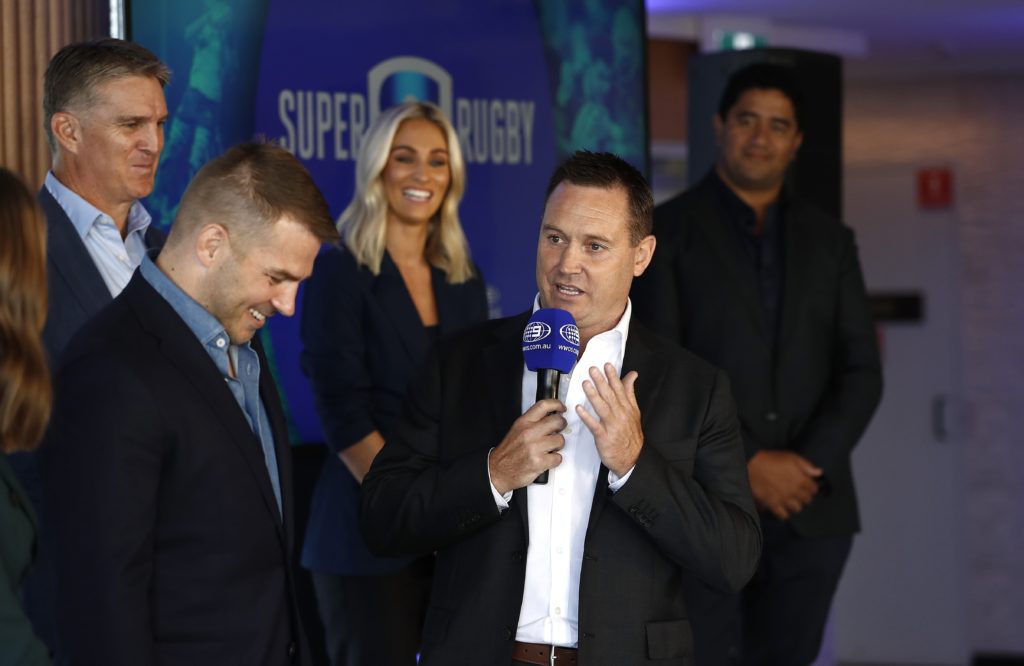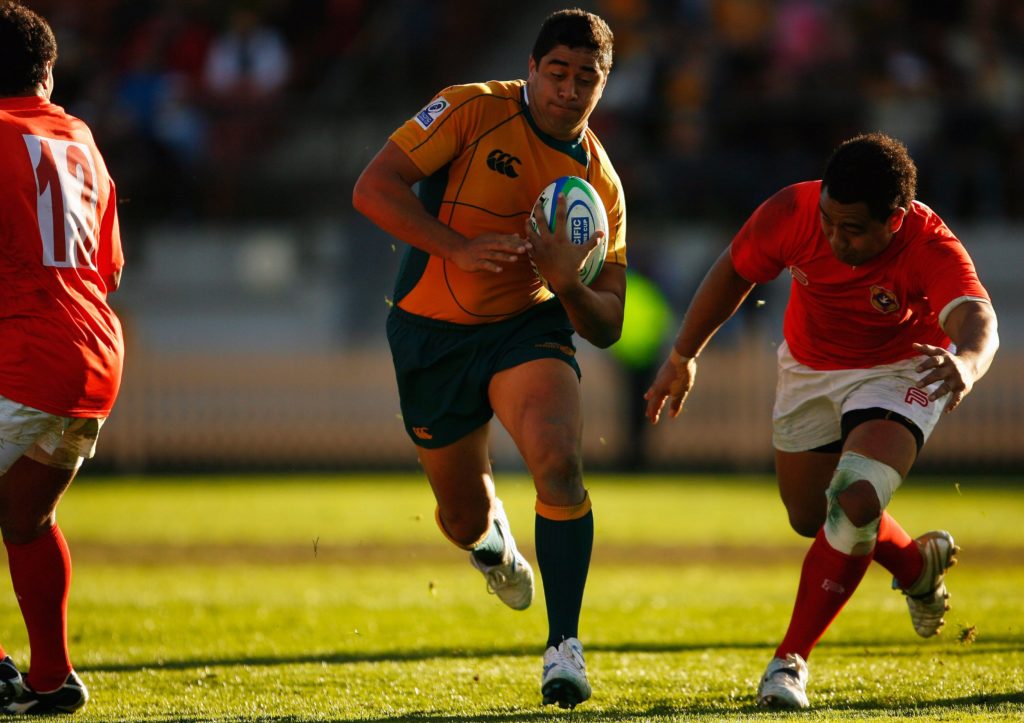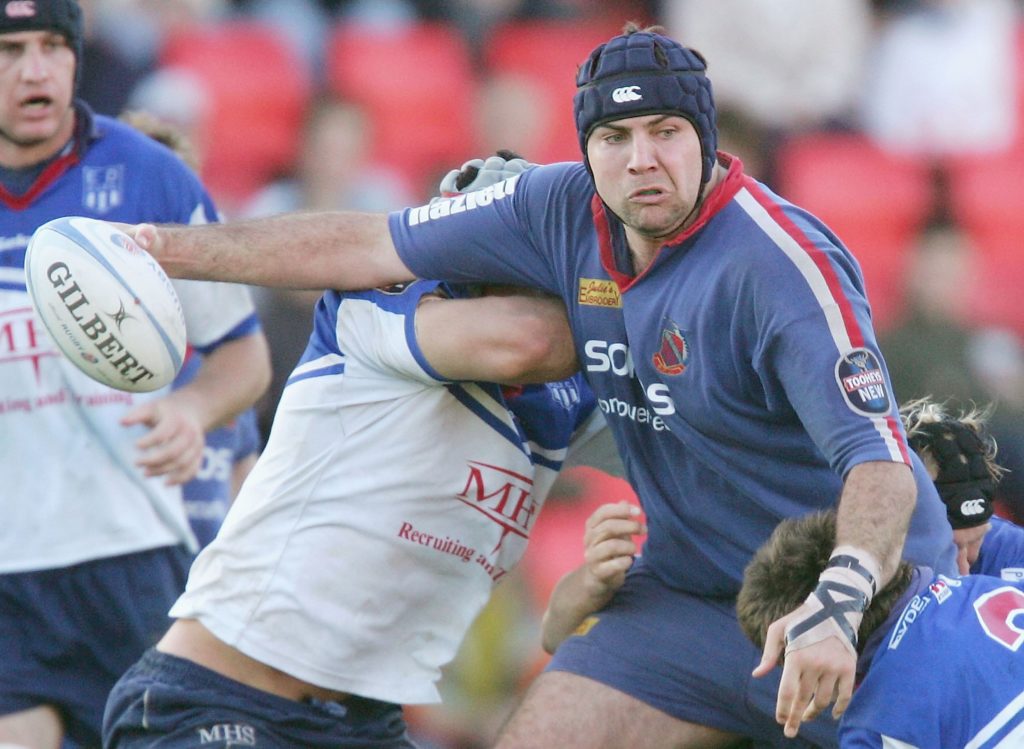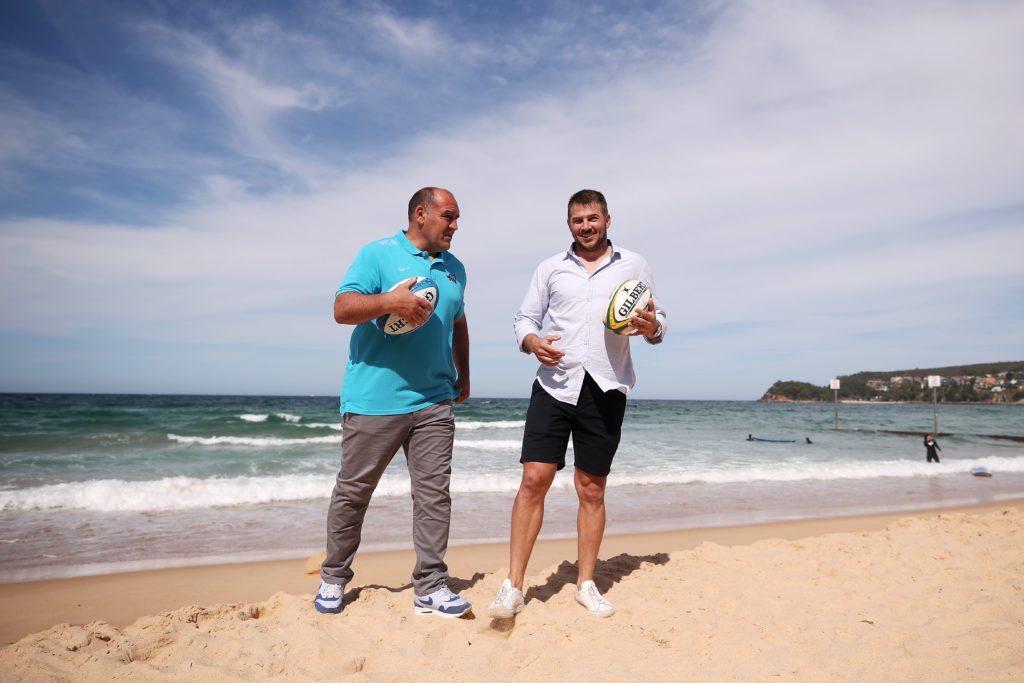A walk down Elizabeth Street in Sydney’s CBD tells you all you need to know: rugby, for the first time in years, is noticeable in Australia – and not just after a Bledisloe Cup series defeat.
It’s not just on bus stops around the city. It’s on billboards everywhere.
After a rugby-free Christmas period, the game they play in heaven is having a re-birth.
When streaming platform Stan, in partnership with Channel 9, joined Rugby Australia as official broadcasters, they asked the governing body what their marketing strategy was over the coming months, as the game entered a new era.
RA, cash-strapped and running short on staff after sweeping redundancies throughout the business, said social media posts and videos. They only had a small five-digit sum to spend on pumping up the game.
Stan, intent on making their foray into sport a success, threw a lazy $10 million at it.
And like when Fox Sports and Channel 7 swooped on Australia’s cricket’s rights in 2018 and a bidding war started to sign up the best and brightest minds for a spell behind the microphone, rugby has had a facelift.

“You’ve got Nine, Wide World of Sports, the gold standard, like, I was in the office the other day and you’re walking down the hallway and there’s Richie [Benaud] and Bill [Lawry] and Tony [Greig] on the wall,” Morgan Turinui tells The XV at the 2021 Super Rugby AU launch in early February.
“As a kid, I watched Wide World of Sports with Mike Gibson and Ken Sutcliffe, and all these great names and they’ve done it for 50 years, so they’ve done it, they know how to do it, it is the genuine top echelon of sport in Australia.
“Then you’ve got this thing at Stan Sport, this whole new streaming platform where you’ve got time and freedom to innovate and perform and tell stories. Last year you had Channel 10 and Fox Sports as well, but this is all one family – so whatever you’ve got on free to air can drag you across to Stan.”
Turinui – the former Wallabies centre – is one of the new faces with an important role to play.
In essence, Turinui will be Nine’s sideline analyst. He’s the new Rod Kafer.
“Mate, that’s as good a compliment as there is,” Turinui responds, when it’s put to him of the voice he’s about to follow.
“Kafe’s the rugby brain. I’m still learning. If I could be some sort of Rod Kafer that’d be a huge compliment.
“What I loved about Kafe was that I learnt stuff off him, but it also didn’t feel like it was a classroom where I was learning about the game. I was still able to enjoy the game, but I watched it in a more informed way, so that’s probably the goal really. Make sure people know we’re having fun, that we love the game, and if we can have people have a great understanding of the game, which is the way Kafe did it, then that’s the perfect situation.”
During his long stint at Fox Sports, Kafer had every Super Rugby coach calling him for advice on a weekly basis.
What I loved about Kafe was that I learnt stuff off him, but it also didn’t feel like it was a classroom where I was learning about the game. I was still able to enjoy the game, but I watched it in a more informed way, so that’s probably the goal really.
Former Wallaby Morgan Turinui
Even today, England coach Eddie Jones calls on Kafer from time to time.
It’s something the public were not privy to, but Kafer had a bigger role to play in Australian rugby than most know.
Interestingly, Kafer and Turinui followed similar paths.
They each had a relatively short time in the Wallabies jersey, with Turinui (20) playing eight more Tests than Kafer, who transitioned from fullback to the playmaking positions after a devasting leg injury. Both featured in a World Cup campaign too, with Kafer part of the 1999 triumph while Turinui’s Wallabies fell short in the 2003 final.
Both men were highly respected by Jones too, with Turinui featuring in all 13 of the Wallabies’ Tests in 2005 and serving as a vice-captain.
Kafer and Turinui also spent time playing overseas and, later, had brief stints coaching.
But did Turinui ever think he was destined to become a commentator?
“Not commentary, not at all,” he says, pulling on his suit jacket.
“You’ve got to have a certain look sometimes for TV, which doesn’t look like what I look like. You grow up and you watch Gordon Bray and Clarkie [Greg Clark] and it was [Simon] Poidevin for a long time and [Chris] ‘Buddha’ Handy and you don’t try to be like guys like that, but you have a life within the game and it ends up here.”

Calling the action is the larger-than-life character Sean Maloney as well as Andrew Swain.
A giant of a human, Maloney grew up on Sydney’s Northern Beaches and like Michael Hooper is regularly seen surfing its breaks.
Maloney, like Swain, is quintessential club rugby.
He broke the rules during his career by playing for northern beaches rivals Manly and Warringah and has done so during his commentary career too.
But what you see with Maloney is what to get.
He’s loud and whacky and enjoys the colourful side of rugby.
“I was so lucky,” Maloney says.
“Steve Jamieson from World Rugby took me aside before my first call at the 2014 Gold Coast Sevens and said, ‘listen, I know what you’re about, I know how you call games, I know your energy, I don’t want you to change anything. The second you move even fractionally away from who you are as a person you’re going to be cooked.
“He said, ‘I’m going to back you’.”
On November 2, 2019, Maloney called the World Cup final between England and South Africa for World Rugby.
He did so in his sandals.
Sitting beside him on that evening in Yokohama was All Blacks great Andrew Mehrtens, who joins Maloney in Nine’s commentary team.
“Seany’s a great bloke, so it’s easy to sit alongside him,” Mehrtens says of Maloney.
“He’s great in the commentary. He’s exciting, he’s edgy, he’s sort of the younger breed of commentator, so while he’s smooth and fluid with all the chat while the action’s going on, which is good for every rugby viewer, he’s also got the witticisms and stuff like that which is appealing to a younger audience who are watching the content on their devices most of the time.
“He’s very keen to bring me in as much as possible. He stands up when he commentates, which is the way he delivers best, he feels most comfortable doing that, so I’m sort of sitting alongside, and he’s a big man as it is, and he’s standing up and then he’ll come leaning in when he says something and hit me on the shoulder as if, ‘join me, say something for goodness sake,’ so it edges you along and it’s a lot of fun.”
While Mehrtens relishes being the butt of jokes, he is a highly astute judge of talent and play.
He believes “cohesion” across all the strands of rugby in Australia is what’s required to get the game back firing.
“Cohesion I think across all the different strands of the game is what’s needed,” says Mehrtens, who has lived in Sydney for the past seven years.
“You’ve got people at the club level really putting the effort in for the kids. I don’t think for a long time they’ve felt that there’s been real moral support. Then you’ve got the schools rugby, I think that needs to expand as well. You’ve got some great traditions whether it’s Newington and Scots and Joeys, let’s maintain that but enhance it and broaden it to other schools. Then there’s the clubs, the Super Rugby franchises and then Australia and I just think everyone putting rugby first will develop a lot better cohesion than there has been.”
Nine have also brought on two females to their coverage, with Roz Kelly to host alongside the well-respected Nick McArdle.
You’ve got people at the club level really putting the effort in for the kids. I don’t think for a long time they’ve felt that there’s been real moral support. Then you’ve got the schools rugby, I think that needs to expand as well. You’ve got some great traditions whether it’s Newington and Scots and Joeys, let’s maintain that but enhance it and broaden it to other schools.
Former All Black Andrew Mehrtens
Allana Ferguson, meanwhile, is destined to become a household name too.
The former dual international was head-hunted by Tim Walsh ahead of the Rio Olympics.
An Oz Tag international, Ferguson was drafted into the Sevens squad that ultimately went on to claim gold.
Ferguson returned to rugby league – her childhood love – after her third ACL injury while playing for the Aussie Sevens side.
The former winger made her way into the NRL media after proving good talent as a player and has made every post a winner since.
“I started on shows, which was a little slower pace and you get to express your opinions and you could chime in whenever and then I got a gig in commentary, and that made me feel more at home and, over time, how to learn the finer details of how to analyse a game,” she says.
“And you do, you watch the game differently, you don’t just sit on the lounge with a drink in your hand and chat. You watch it, you make notes and you analyse different players and their skills.
“I was lucky enough one week my boss called me and said, ‘How would you feel about being in the commentary team one week?’
“I said, ‘Sure’.
“I had goosebumps running down my spine because that’s the pinnacle.
“And he said, ‘If it works, we’ll ask you the next week and if doesn’t, it doesn’t’.
“I just kept getting that gig.”

Another with a league background is the Wallabies’ greatest tryscorer at World Cups, Drew Mitchell.
The former outside back had a brief stint at Fox Sports and was thrown in the deep end, with the Wallabies on a slide under Michael Cheika and turmoil throughout the code following Israel Folau’s controversial social media posts which ultimately saw his contract torn up.
“I think during my time at Fox we were faced with some pretty big issues around the game and some that involved teammates of mine and friends of mine that I had to speak honestly about,” he reflects.
“The one thing that I write down in my notebook before I go on air is to not say anything that I wouldn’t say to somebody’s face. I can still be critical, and anyone that I played with knew that I would be honest, but I would say it to their face.”
Mitchell’s arrival at Nine comes at a point when Australian rugby fears losing its best talent overseas.
I think during my time at Fox we were faced with some pretty big issues around the game and some that involved teammates of mine and friends of mine that I had to speak honestly about.
Former Wallaby Drew Mitchell
The try scoring machine, who won the Heineken Cup with Toulon playing alongside Matt Giteau and Jonny Wilkinson and later set up one of the tries of the 2015 World Cup against Argentina at Twickenham, doesn’t see it that way though.
“We’ve seen so many players go and come back and their game has developed,” he reflects.
“Every one of the Australian coaching staff have gone and plied their craft overseas and they’ve come back better coaches, so why is it any different for a player?
“If it works for coaches, it can work for players as well.

“I know that we want to keep the best players playing here in Australia, but as long as we can find a way that we have access to them, or they get to a point where they feel their game is strong enough to contest for a Wallaby gold jersey and they come back, then that’s going to be beneficial to us.
“We always talk about the strength of our game is being a global game and we’ve got to take advantage of that. Players going and learning how the English or South African or the French or the Argentinians approach the game and bringing it back to Australia is only going to help our game.”
Two-time World Cup-winner Tim Horan has, too, transitioned over from Fox Sports after being at the pay-TV network since 2011.
In fact, he’s been commentating since the 2003 tournament.
I started on shows, which was a little slower pace and you get to express your opinions and you could chime in whenever and then I got a gig in commentary, and that made me feel more at home and, over time, how to learn the finer details of how to analyse a game.
Former Australian Sevens player Allana Ferguson
So, what keeps him motivated to keep commentating?
“I think because going to country areas around Australia, whether it’s Longreach or Narrabri, going to country areas you see that the game means something to them,” Horan says.
“The passion I’ve got is people still follow the game. They love the game of rugby, so you want to keep promoting it. That’s what drives me to commentate it. To try to get more people to understand and love the game because when you go to those country areas, you see it.”
On Tuesday, Nine Entertainment announced that former Wallabies coach Cheika and 1991 World Cup winner David Campese would join the commentary team.
The duo has seldom struggled to attract a headline.
It can only be a good thing for rugby in Australia.
More stories from Christy Doran
If you’ve enjoyed this article, please share it with friends or on social media. We rely solely on new subscribers to fund high-quality journalism and appreciate you sharing this so we can continue to grow, produce more quality content and support our writers.



Comments
Join free and tell us what you really think!
Sign up for free